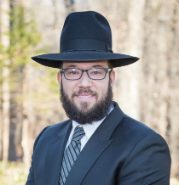Holding complexity, simply / Graceful Masculinity: Yitro
Part of a year-long Torah series on graceful masculinity and Jewish values.

אָנֹכִי יְקוָק אֱלֹהֶיךָ, אֲשֶׁר הוֹצֵאתִיךָ מֵאֶרֶץ מִצְרַיִם מִבֵּית עֲבָדִים: I am Hashem, your G-d, who took you out of the land of Egypt, from the house of slaves. (Exodus 20:2)
The Divine Revelation at Mount Sinai was God’s coming out speech. In it, G-d tells us about G-d’s self. G-d is everywhere, all of the time, relating to everything in this world in countless ways — and G-d is One. Indeed, what may be most complicated to grasp about G-d is G-d’s utter simplicity.1
“I am Hashem your God” is confusing for us. The verse includes two different names for G-d – Hashem and Elokim. One name for G-d seems to be individualized (Elokecha, “your” God), while the other name sounds absolute.2 The variations we perceive between these different names of G-d are a result of G-d reflecting our diversity back to us in relationship.
It’s interesting that G-d introduces G-d’s self as the G-d of the Exodus from Egypt. Here, at Mount Sinai, G-d presented as “an old man full of mercy.” Earlier, at the splitting of the sea, G-d appeared as a “mighty warrior.” Even though the people of Israel perceived God differently, God is in fact One and the same. G-d is explaining: “Since I change appearances, do not say that there are two different powers”.3
G-d’s simplicity continues to be complex for us. It certainly could have been a more powerful claim to simply state: “I am Hashem your G-d who created the universe.” But that is harder for us to relate to. No one was there at the time of Creation, but everyone at Mount Sinai had just witnessed the ten plagues and the splitting of the sea.
In preparation for experiencing the revelation of G-d at Sinai, the verse testifies, “Israel (singular) encamped there, opposite the mountain” וַיִּחַן-שָׁם יִשְׂרָאֵל, נֶגֶד הָהָר. (Exodus 19:2) Rashi explains that Israel is described in the singular to indicate that they encamped as one person with one heart. To encamp, וַיִּחַן, is a language of grace.4 Gathering the entire nation, unified in purpose and intention is not a small task, and was only made possible because of this attribute of grace. It allowed everyone to see each other’s character traits, and not to hate or separate from each other because they were different.5
The Divine revelation required a process of relatability: separate and distinct things coming together as one. In truth, we are all made of the same traits, attributes, and characteristics, just blended in unique ways with individualized expressions. Below the surface we all carry similar things, just in different ways, the result of our own life experiences.
We are each a part of the whole of humanity. Nothing is found in the whole except that which is found in the individual.6 There is a part of each of us in the other. This is true of the commandments as well. For example, there is a mitzvah to honor the Sabbath; and every mitzvah also has an aspect of honor in it. The red heifer is emblematic of an unintelligible commandment; and we also recognize that every mitzvah has aspects beyond our comprehension. “I am Hashem your G-d” is necessary for it all.
The manifestation of a trait, as the dominant expression in the moment, doesn’t minimize the existence of all of the other attributes that also make us who we are. When we dismiss people by what we think defines them, we flatten the depth and deny the complexities of G-d’s creations. When we recognize each person as valuable for specifically the constellation of character traits that makes them unique (and different from us), we come closer to perceiving and understanding the total unity of G-d.
Discussion questions:
When we first introduce ourselves to someone, we know that it takes a long time to really get to know someone. Why then are we so quick to judge each other?
What are some ways that we can build relationships with those who see the world differently than we?
The Talmud is filled with righteous people arguing. What are appropriate ways for reasonable people to disagree?
How can we foster more robust conversations about complex issues with more grace and respect?
1. R’ Moshe Chaim Luzzatto’s fifth principle about Hashem: “One must further know that Hashem’s existence is simple, without any composite or multiplicity. All perfections in their entirety are found within G-d in a simple way (שמציאותו יתברך שמו מציאות פשות).↩
2. עיין בתפארת ישראל קז↩
3. Rashi 20:2 ↩
4. הרבי מוורקה↩
5. כד הקמח↩
6. אין בכלל אלא מה שבפרט↩

By Rabbi Mike Moskowitz. See other #MenschUp posts here.









